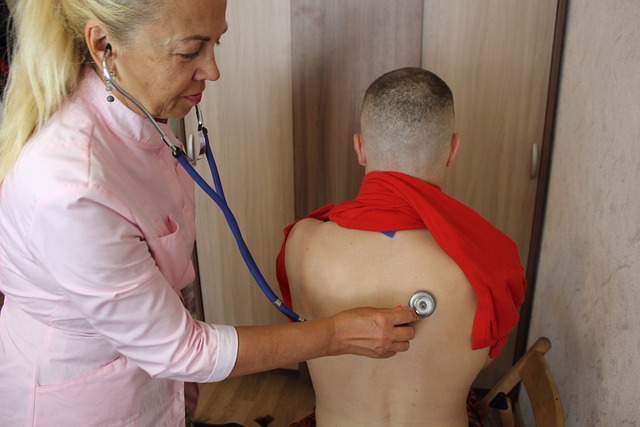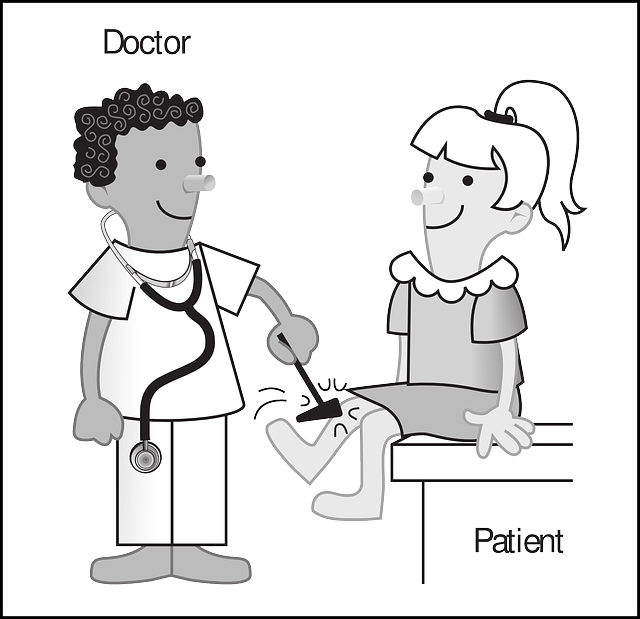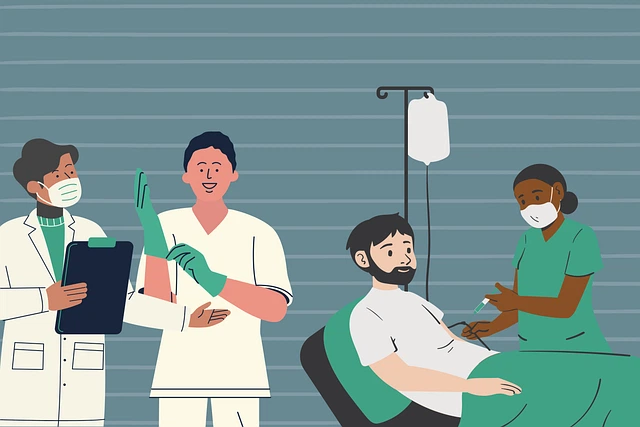The UK's multicultural population requires accurate and accessible translations of Patient Information Leaflets (PILs) to ensure that all patients, regardless of their linguistic background, can understand their medication instructions and potential risks effectively. Translation services for PILs in the UK have been significantly enhanced by advancements in machine learning and natural language processing technologies, which provide precise and culturally sensitive translations. These innovations are crucial in adapting medical information to be both contextually and linguistically appropriate for diverse groups within the UK, thereby upholding patient safety and improving health outcomes. The commitment to providing high-quality PIL translations underscores the UK's dedication to inclusive healthcare practices and reinforces its position as a leader in patient-centric healthcare solutions.
In the intricate interplay of healthcare and communication, the clarity and accuracy of Patient Information Leaflets (PILs) are paramount for patient safety and informed consent in the UK. This article delves into the critical role of translation services for PILs UK, addressing regulatory standards, the nuances of medical terminology translation, and the profound impact these leaflets have on patients’ understanding and well-being. We will explore best practices, successful case studies, technological innovations, and the importance of culturally sensitive language in PIL translations, ensuring that every patient can navigate their medication with confidence and clarity.
- Understanding the Importance of Clear and Accurate PILs in the UK
- The Role of Translation Services in PIL Distribution
- Regulatory Requirements for PILs in the UK Pharmaceutical Market
- Challenges in Translating Medical Terminology for PILs
- Best Practices for Translating Patient Information Leaflets
- The Impact of Accurate PILs on Patient Comprehension and Safety
- Case Studies: Successful PIL Translation Projects in the UK
- Technological Advancements Aiding PIL Translation Quality
- Ensuring Culturally Sensitive Language in PIL Translations
- The Future of PIL Translation Services in the UK Healthcare System
Understanding the Importance of Clear and Accurate PILs in the UK

In the United Kingdom, the clarity and accuracy of Patient Information Leaflets (PILs) are paramount to ensuring patient safety and informed decision-making. These documents, which accompany medications prescribed by healthcare professionals, serve as a critical source of information for patients, guiding them on how to use their medication correctly, understand potential side effects, and recognise when to seek medical advice. The importance of PILs being clear and accurate cannot be overstated, as they facilitate the safe and effective use of medicines. For a diverse population like that in the UK, which includes patients who may prefer or require information in languages other than English, translation services for PILs play a vital role. These services ensure that language barriers do not compromise patient understanding or safety. The translation must be precise, capturing the nuances of both the source and target languages to maintain the integrity of the original content. This is particularly important given the complex pharmaceutical terminology often found in PILs. As such, investment in high-quality translation services for PILs is not just a legal requirement under EU regulations but also an ethical imperative to uphold patient care standards across the UK. It underscores a commitment to inclusivity and patient safety, ensuring that every individual has access to medication information they can understand and act upon confidently.
The Role of Translation Services in PIL Distribution

Ensuring that Patient Information Leaflets (PILs) are clear and accurate is paramount for patient safety and understanding of medication usage in the UK. The translation of PILs into multiple languages, facilitated by specialist translation services, is a critical step in this process. These services not only adapt the content to be linguistically correct but also contextually appropriate, taking into account the diverse cultural backgrounds of UK residents. The precision of these translations is crucial because it ensures that all patients can access and comprehend the necessary information about their medications, regardless of their language proficiency or first language. This inclusivity enhances patient autonomy and adherence to treatment plans, ultimately improving healthcare outcomes. Moreover, translation services for PILs are subject to rigorous quality assurance processes, which involve expert translators, reviewers, and industry specialists who collaborate to deliver a document that maintains the integrity of the original text while being accessible to a broader audience. The role of these services in the UK’s healthcare system is increasingly significant as it promotes equitable access to health information and supports the nation’s commitment to providing high-quality, patient-centered care.
Regulatory Requirements for PILs in the UK Pharmaceutical Market

In the UK, Pharmaceutical companies are mandated to provide clear and precise Patient Information Leaflets (PILs) alongside their medicinal products. These PILs serve as a critical source of information for patients, offering guidance on the correct usage, potential side effects, contraindications, and necessary precautions. The regulatory framework governing the content and clarity of PILs is stringent, with the Medicines and Healthcare products Regulatory Agency (MHRA) overseeing their compliance. For PILs to be effective across diverse populations, including those who may not speak English as their first language, translation services for PILs are essential. These translations must accurately convey complex medical information into other languages while maintaining the integrity of the original content, ensuring that all patients can understand and safely use their medicines. The translation process must adhere to specific guidelines and quality standards, such as those provided by the MHRA, to ensure that the translated PILs are both clear and accurate, thus safeguarding patient safety and promoting effective communication between healthcare providers and patients.
To comply with UK regulations, pharmaceutical companies must engage with professional translation services specializing in medical content. These services not only translate the text but also adapt it to fit cultural nuances and regulatory requirements specific to each target language market. This adaptation process is crucial for PILs, as it ensures that the translated material is understandable and relevant to the patient population for whom it is intended. The use of expert translation services for UK Patient Information Leaflets is not just a compliance issue but a fundamental aspect of patient care, enhancing the overall quality and safety of healthcare provision within the UK pharmaceutical market.
Challenges in Translating Medical Terminology for PILs

The translation of medical terminology within Patient Information Leaflets (PILs) presents unique challenges, particularly when catering to the diverse linguistic landscape of the UK. Ensuring that translation services for PILs in the UK accurately convey complex medical information is critical for patient safety and understanding. The complexity arises from the need to maintain the precision and clarity of the original text, which often contains specialized medical terms and multifaceted instructions. Translators must navigate the nuances of both source and target languages, as well as the cultural contexts, to provide a PIL that is not only linguistically correct but also culturally appropriate and easily comprehensible for patients who speak or read another language. This involves a deep understanding of both the medical content and the cultural idioms, expressions, and perceptions related to healthcare in different communities within the UK. Moreover, maintaining consistency across all PIL translations is essential to ensure that patients receive uniform guidance regardless of their preferred language. The stakes are high, as incorrect translations could lead to misunderstandings or misuse of medications, potentially affecting patient health outcomes. Therefore, it is imperative for translation services for PILs in the UK to employ specialized medical translators who are not only proficient linguistically but also have a thorough grasp of medical terminology and regulatory requirements specific to the pharmaceutical industry.
Best Practices for Translating Patient Information Leaflets

When translating Patient Information Leaflets (PILs) for a UK audience, it is imperative to adhere to best practices that ensure clarity, accuracy, and regulatory compliance. The translation process must be executed by professionals with expertise in medical terminology and the specific language pair involved. Utilizing specialized translation services for PILs in the UK context requires not only a deep understanding of the source and target languages but also familiarity with the medicinal products’ intended use and patient populations. Translators should employ linguistically validated terms to maintain consistency across documents and ensure that the information is both comprehendible and trustworthy for patients who rely on these leaflets for understanding their medication.
Moreover, the translation services for PILs must align with the UK’s Medicines and Healthcare products Regulatory Agency (MHRA) guidelines, as well as other relevant legal and regulatory standards. This includes adhering to Good Practice Guidelines for Translation and Localisation of Prescribed Medical Information in Europe. The translation should be verifiable against the original PIL, with any necessary modifications reflected accurately to preserve the integrity of the content. Engaging in a rigorous quality assurance process, including peer reviews and patient testing, further guarantees that the translated PILs are suitable for their intended audience, thereby upholding patient safety and fostering informed decision-making.
The Impact of Accurate PILs on Patient Comprehension and Safety

Accurate Patient Information Leaflets (PILs) play a pivotal role in ensuring that patients within the UK fully understand how to safely and effectively use their medication. The clarity of PILs directly influences patient comprehension, which is critical for adherence to treatment regimens. When PILs are written and presented in clear, concise language, patients are more likely to follow the prescribed course of therapy. This not only enhances the efficacy of the medication but also reduces the risk of incorrect self-medication, which can lead to adverse outcomes or drug interactions.
The translation of PILs into various languages, facilitated by specialized translation services for Patient Information Leaflets in the UK, is equally important. Such translations bridge language barriers and make medication information accessible to a diverse patient population. This accessibility is crucial for patients who may not be fluent in English or have difficulty understanding complex medical terminology. By ensuring that PILs are both linguistically and culturally appropriate, healthcare providers can significantly improve patient safety and outcomes, thereby upholding the standards of patient care in the UK’s multicultural society.
Case Studies: Successful PIL Translation Projects in the UK

In the United Kingdom, the accuracy and clarity of Patient Information Leaflets (PILs) are paramount to ensure patient understanding and safety. Translation services for PILs have become an essential aspect of healthcare, particularly with the diverse population that resides in the UK. Successful translation projects have been implemented across various NHS trusts and private healthcare providers, demonstrating the effective communication between healthcare professionals and patients who speak different languages or prefer to read in their native tongue. For instance, a notable project involved translating PILs into ten major languages, which was executed by a leading translation service provider specializing in medical content. This initiative significantly improved patient comprehension and adherence to medication instructions, thereby enhancing overall healthcare outcomes. Another successful case study involved the translation of PILs for a common chronic medication into British Sign Language (BSL). This project not only expanded accessibility but also set a new standard for inclusivity within the UK’s medical community, ensuring that deaf patients could receive the same level of information as hearing patients. Both projects underscore the importance of high-quality translation services in the realm of healthcare and highlight the UK’s commitment to providing clear and accurate PILs for all patients, regardless of their linguistic background or disability.
Technological Advancements Aiding PIL Translation Quality

The translation of Patient Information Leaflets (PILs) in the UK has been significantly enhanced by technological advancements, particularly in the realm of machine learning and natural language processing. These cutting-edge technologies have facilitated the development of advanced translation services for PILs, ensuring that patients across different linguistic communities can access medication information with clarity and accuracy. The integration of artificial intelligence (AI) algorithms has led to more nuanced translations that maintain the original context and meaning of the text. This is crucial for PILs, where accurate communication of instructions, warnings, and dosage information could influence patient outcomes.
Moreover, the use of these technologies has streamlined the translation process, enabling quicker turnaround times without compromising on quality. Continuous learning systems are employed to refine translations over time, incorporating feedback from healthcare professionals and patients to improve precision and compliance with regulatory standards. This ongoing optimization ensures that each translated PIL is tailored to meet the linguistic and cultural nuances of its intended audience, thereby enhancing patient safety and understanding of their medications.
Ensuring Culturally Sensitive Language in PIL Translations

In the process of providing patient information leaflets (PILs) to a diverse populace within the United Kingdom, it is imperative to ensure that translation services for PILs are not just linguistically accurate but also culturally sensitive. The UK’s population is rich in cultural and linguistic diversity, with individuals speaking over 300 different languages. This heterogeneity necessitates a careful approach when translating PILs. Culturally sensitive language adaptation ensures that the medical terminology, instructions for use, and safety information are not only accurate but also resonate with the patients’ cultural context. For instance, idiomatic expressions or phrases that may be common in English should be carefully considered and possibly replaced with equivalent concepts that are understood universally within the target language group. This approach is crucial in maintaining patient trust and ensuring they fully understand how to use medications safely and effectively.
Translation services for PILs UK must employ expert translators who are not only proficient in both source and target languages but also have a profound understanding of the cultural nuances that can affect communication. These professionals should ideally possess a background in medicine or healthcare, enabling them to accurately convey complex medical information without losing its intended meaning. By leveraging specialized translation services for PILs, pharmaceutical companies and regulatory bodies can provide clear, accurate, and culturally tailored guidance to patients from different linguistic and cultural backgrounds, thereby enhancing patient safety and treatment outcomes across the UK.
The Future of PIL Translation Services in the UK Healthcare System

The future of translation services for Patient Information Leaflets (PILs) within the UK healthcare system is poised to be transformative, with significant advancements anticipated in both technology and practice. As the UK’s demographic landscape becomes increasingly diverse, the need for clear and accurate PIL translations has never been more critical. The current challenge involves ensuring that a wide range of languages are covered effectively, allowing for seamless communication across different linguistic communities. In this context, the adoption of advanced translation technologies, such as machine learning algorithms and natural language processing, is set to revolutionise the way PILs are translated and localised. These innovations promise to enhance the accuracy and reliability of translations, making them more accessible to a broader patient population. Furthermore, the integration of these technologies within existing healthcare systems necessitates careful planning and coordination with healthcare providers, regulatory bodies, and language experts to guarantee that all translations meet the highest standards of clarity and precision. The commitment to providing high-quality translation services for PILs in the UK will not only improve patient safety and understanding but also position the UK as a leader in inclusive healthcare practices on a global scale.
In concluding, the significance of clear and accurate Patient Information Leaflets (PILs) in the UK healthcare system is paramount. The meticulous process involving translation services for PILs UK-wide ensures that patients from diverse linguistic backgrounds can understand medication instructions safely and effectively. This comprehensive analysis has highlighted the multifaceted approach required to meet regulatory standards, overcome challenges inherent in translating complex medical terminology, and embrace technological advancements to enhance translation quality. By adhering to best practices and ensuring culturally sensitive language, healthcare providers and translation services contribute to patient safety and informed decision-making. As the UK continues to diversify, the future of PIL translation services is set to play a pivotal role in maintaining the highest standards of care for all patients. It is through such dedicated efforts that the integrity of healthcare communication is upheld, thereby promoting better health outcomes across the nation.
